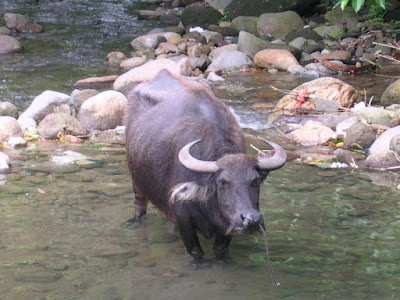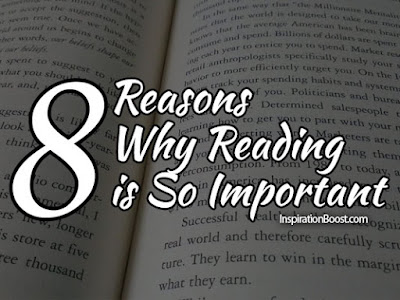Reading Notes: The Three Friends: the Monkey, the Dog, and the Carabao
I like the simple yet very interesting format of this narrative story. The story begins with three animal friends, monkey, dog, and carabao going out to the country to hunt.
I thought it's really interesting that these animals, who are animals themselves, fried the meat to eat like humans: "After the monkey and the dog had departed, the carabao began to fry the meat."
The imagination of the author is purely stunning: Animals that act like humans. They have greed and fight like animals: "Seeing this chance to fill his stomach, the Buñgisñgis went up to the carabao and said, 'Well, friend, I see that you have prepared food for me.'"
Buñgisñgis won the fight and took the food that carabao was preparing to eat.
This part of the story is very interesting because this is what humans do: "The Buñgisñgis saw them cooking, but he did not dare attack all three of them at once, for in union there is strength."
Even the gangsters, when they are outnumbered, shy away from fights. Bungisngis was calculating like a human.
Monkey was the cleverest animal of all. Obviously monkey is most similar to a human, so the author made monkey the smartest and cleverest animal. "When the Buñgisñgis came, the monkey said very politely, 'Sir, you have come just in time. The food is ready, and I hope you’ll compliment me by accepting it.'" This politeness is extremely cunning.
This kind of behavior is not what animals usually do, so I thought it was a really cool imagination of the author.
Buñgisñgis was fooled again by the monkey. Monkey's cleverness to crisis was amazing:
"The monkey placed the boa-constrictor around the body of the Buñgisñgis. Then he pinched the boa, which soon made an end of his enemy."
This story of three boys made a shrill in my back because I'm in the same situation as they are: "He sent all his boys to another town to school. But these three brothers did not study: they spent their time in idleness and extravagance. When vacation came, they were ashamed to go back to their home town because they did not know anything."
These boys are obviously not good students and wasted their time, their parents' investment.
The old woman is very cunning by calling the boys "my grandsons." They are, in fact, not her actual grandsons, but it obviously sounded very friendly. I ask a lot of questions before making purchases to make sure what I'm buying valuable stuffs that are worthy of my money. So, I didn't have commonality in this part with the boys.
This argument between the boys was very interesting: "Ambo said, 'I am the one who should have her, for it was I who restored her to life.'
'But if it had not been for me, we should not have the lady with us,' said Iloy.
'And if it had not been for me,' said Suan, 'we should all be dead now, and nobody could have her.'"
Obviously the boys were in conflict because there was only one lady.
Suan's purchase of uniting stone turned out to be the most useful although his purchase seemed worthless and least charming at first: "Suan picked up the shares of his two brothers and united them with his own."
Bibliography:
Filipino Popular Tales by Dean S. Fansler (1921).
I thought it's really interesting that these animals, who are animals themselves, fried the meat to eat like humans: "After the monkey and the dog had departed, the carabao began to fry the meat."
The imagination of the author is purely stunning: Animals that act like humans. They have greed and fight like animals: "Seeing this chance to fill his stomach, the Buñgisñgis went up to the carabao and said, 'Well, friend, I see that you have prepared food for me.'"
Buñgisñgis won the fight and took the food that carabao was preparing to eat.
This part of the story is very interesting because this is what humans do: "The Buñgisñgis saw them cooking, but he did not dare attack all three of them at once, for in union there is strength."
Even the gangsters, when they are outnumbered, shy away from fights. Bungisngis was calculating like a human.
Monkey was the cleverest animal of all. Obviously monkey is most similar to a human, so the author made monkey the smartest and cleverest animal. "When the Buñgisñgis came, the monkey said very politely, 'Sir, you have come just in time. The food is ready, and I hope you’ll compliment me by accepting it.'" This politeness is extremely cunning.
This kind of cooperated teamwork among animals is also fascinating: "The Buñgisñgis gladly accepted the offer and, after sitting down in a chair, began to devour the food. The monkey took hold of a leg of the chair, gave a jerk, and sent his guest tumbling into the pit. He then filled the pit with earth so that the Buñgisñgis was buried with no solemnity."
This kind of behavior is not what animals usually do, so I thought it was a really cool imagination of the author.
Buñgisñgis was fooled again by the monkey. Monkey's cleverness to crisis was amazing:
"The monkey placed the boa-constrictor around the body of the Buñgisñgis. Then he pinched the boa, which soon made an end of his enemy."
This story of three boys made a shrill in my back because I'm in the same situation as they are: "He sent all his boys to another town to school. But these three brothers did not study: they spent their time in idleness and extravagance. When vacation came, they were ashamed to go back to their home town because they did not know anything."
These boys are obviously not good students and wasted their time, their parents' investment.
The old woman is very cunning by calling the boys "my grandsons." They are, in fact, not her actual grandsons, but it obviously sounded very friendly. I ask a lot of questions before making purchases to make sure what I'm buying valuable stuffs that are worthy of my money. So, I didn't have commonality in this part with the boys.
This argument between the boys was very interesting: "Ambo said, 'I am the one who should have her, for it was I who restored her to life.'
'But if it had not been for me, we should not have the lady with us,' said Iloy.
'And if it had not been for me,' said Suan, 'we should all be dead now, and nobody could have her.'"
Obviously the boys were in conflict because there was only one lady.
Suan's purchase of uniting stone turned out to be the most useful although his purchase seemed worthless and least charming at first: "Suan picked up the shares of his two brothers and united them with his own."
Carabao in the Philippines. Source: Carabao
Bibliography:
Filipino Popular Tales by Dean S. Fansler (1921).



Comments
Post a Comment